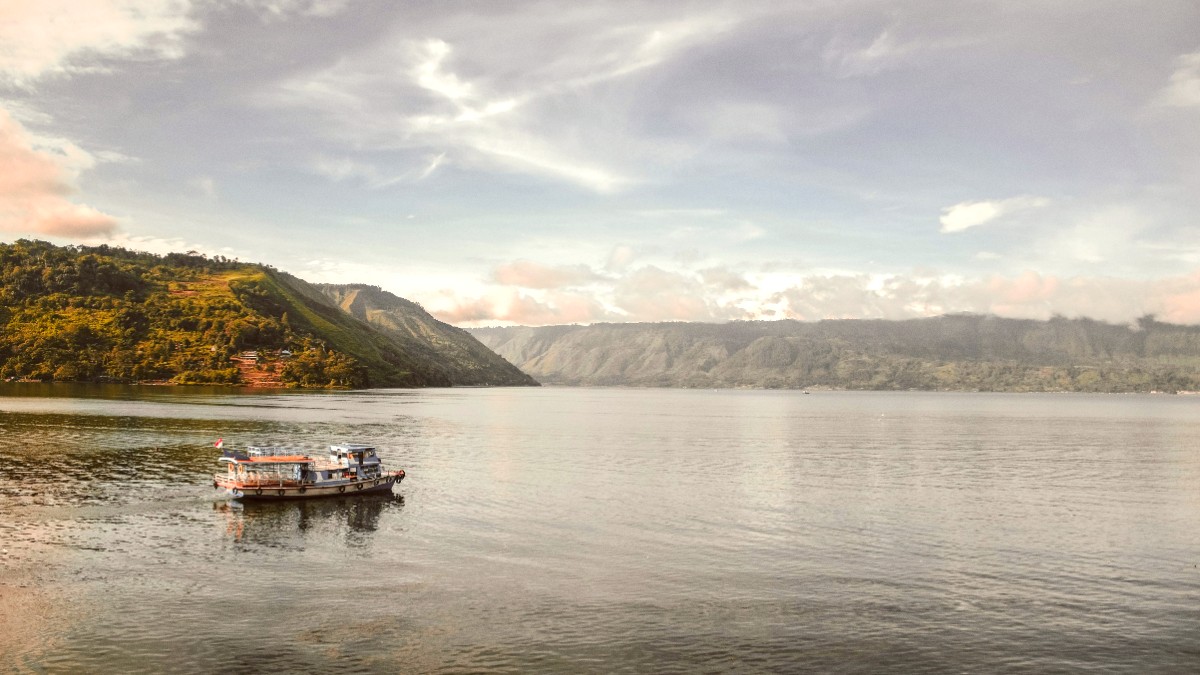
Sumatra, Indonesia
Lake Toba maintains relatively stable temperatures throughout the year, a benefit of its highland location. Average daily temperatures typically range from 20°C (68°F) to 30°C (86°F). Evenings often bring cooler temperatures, sometimes dropping to around 18-20°C (64-68°F), a pleasant respite from daytime warmth. This consistent temperature range makes Lake Toba a year-round destination, but precipitation patterns differ significantly between seasons.
The dry season runs from May to September. Expect less rainfall and sunnier days during this period. Skies are often clearer, offering unobstructed views of the lake and surrounding landscapes. Humidity persists, as typical for tropical environments, but it feels less oppressive due to higher elevation and the absence of constant rain. This season is ideal for outdoor activities and water sports, with calm lake conditions making swimming and boating more inviting.
The wet season extends from October to April. During these months, the region experiences higher rainfall. November to February typically sees the heaviest rains. Do not expect continuous downpours all day; tropical rain often comes in heavy, brief showers, usually in the afternoon or evening. Mornings can still be sunny, presenting opportunities for outdoor exploration before the rain arrives. Humidity levels are generally higher during this season due to the increased moisture in the air.
High Season (June to August, December to January): Best weather for outdoor activities. Skies are often clear, and sunshine is plentiful, ideal for swimming, boating, and exploring. Events and cultural performances may happen more often. Expect more crowds, especially around major holidays. Accommodation prices can rise, and popular attractions may see more visitors. Booking in advance proves beneficial.
Tropical climate patterns
Lake Toba experiences monsoon patterns, which define the wet and dry seasons. Heavy rain is a feature of the wet season, but it rarely causes major travel issues beyond temporary road slipperiness or brief disruptions.
You will not experience extreme temperature fluctuations; temperatures remain relatively stable throughout the year due to the consistent tropical highland climate.
April-May, September-October
Experience good weather with fewer tourists than the peak months. Prices for accommodation and activities may be slightly lower, offering improved value. The landscape appears specifically lush and green after recent rains, or as the dry season begins.
Expect the possibility of some rain, notably towards the end of May or in October. Rain showers are usually brief but can affect outdoor plans.
February-March, November
Fewer tourists create a more tranquil experience. Enjoy lower prices for accommodation and some activities. This period presents an opportunity to experience local life more authentically, engaging with fewer tourist crowds. It is ideal for a peaceful retreat.
A higher chance of rain exists, which can disrupt outdoor plans. Some smaller facilities might have reduced hours or close temporarily. Travel might be slower due to wet road conditions.
The dry season (June-August) presents the best conditions with ample sunshine and calmer lake waters. The water is refreshing year-round.
The dry season (June-August) provides clearer trails and better views. Shoulder seasons also present pleasant conditions if you do not mind occasional showers, as cooler temperatures make hiking comfortable.
Cultural activities and relaxation welcome visitors year-round. The low season offers a more tranquil experience with fewer crowds, making it easier to engage with local communities.
Visiting during a local festival (check local calendars) also enriches your cultural experience.
Rules can change, so always check the latest information from the Indonesian embassy or consulate in your home country before you travel.
Citizens of over 90 countries qualify for visa-free entry for tourism purposes for stays up to 30 days. This category encompasses citizens from the United States, Canada, Australia, most European Union countries, the United Kingdom, Japan, South Korea, Singapore, and Malaysia. This visa-free entry cannot be extended. You simply proceed to immigration upon arrival.
Regardless of your visa category, you present certain documents:
Costs vary based on your travel style, from budget-conscious backpacking to more luxurious experiences.
These are approximate daily costs per person, excluding international flights to Indonesia.
Currency: The official currency is the Indonesian Rupiah (IDR). The exchange rate fluctuates. Check current rates before your travel (e.g., 1 USD typically exchanges for 15,000-16,000 IDR).
Exchange: Major cities like Medan or Jakarta offer better exchange rates than smaller towns. In Lake Toba, exchange offices are available, specifically in Tuk Tuk on Samosir Island, but rates might be slightly less favorable. Avoid unofficial money changers.
Daily costs for budget travelers (IDR 300,000 - 500,000 / US$20-35).
Accommodation: IDR 100,000 - 200,000 for a fan-cooled guesthouse room or a dorm bed.
Meals: IDR 75,000 - 150,000 for eating at local warungs (small eateries) and street food stalls. This covers three meals a day, often with a drink.
Daily costs for mid-range travelers (IDR 500,000 - 1,000,000 / US$35-70).
Accommodation: IDR 200,000 - 500,000 for an air-conditioned hotel or guesthouse with a private room, often with a pool or more amenities.
Transportation: IDR 100,000 - 200,000. This might include using more comfortable shared minivans for inter-city travel, longer scooter rentals, or occasional short taxi rides.
Daily costs for luxury travelers (IDR 1,000,000+ / US$70+).
Accommodation: IDR 500,000+ for boutique hotels or resorts with premium amenities, better service, and spacious rooms, potentially with private lake access.
Transportation: IDR 200,000+. This budget allows private cars with drivers for transfers and day trips, offering convenience and comfort.
| Category | Price Range (IDR) | Notes |
|---|---|---|
| Accommodation (per night) | 70,000 - 1,500,000+ | From hostels to resorts. |
| Meals (per dish) | 15,000 - 250,000+ | Local warung to fine dining. |
| Transportation (daily) | 15,000 (ferry) - 800,000 (private car) | Ferry to scooter to private transfer. |